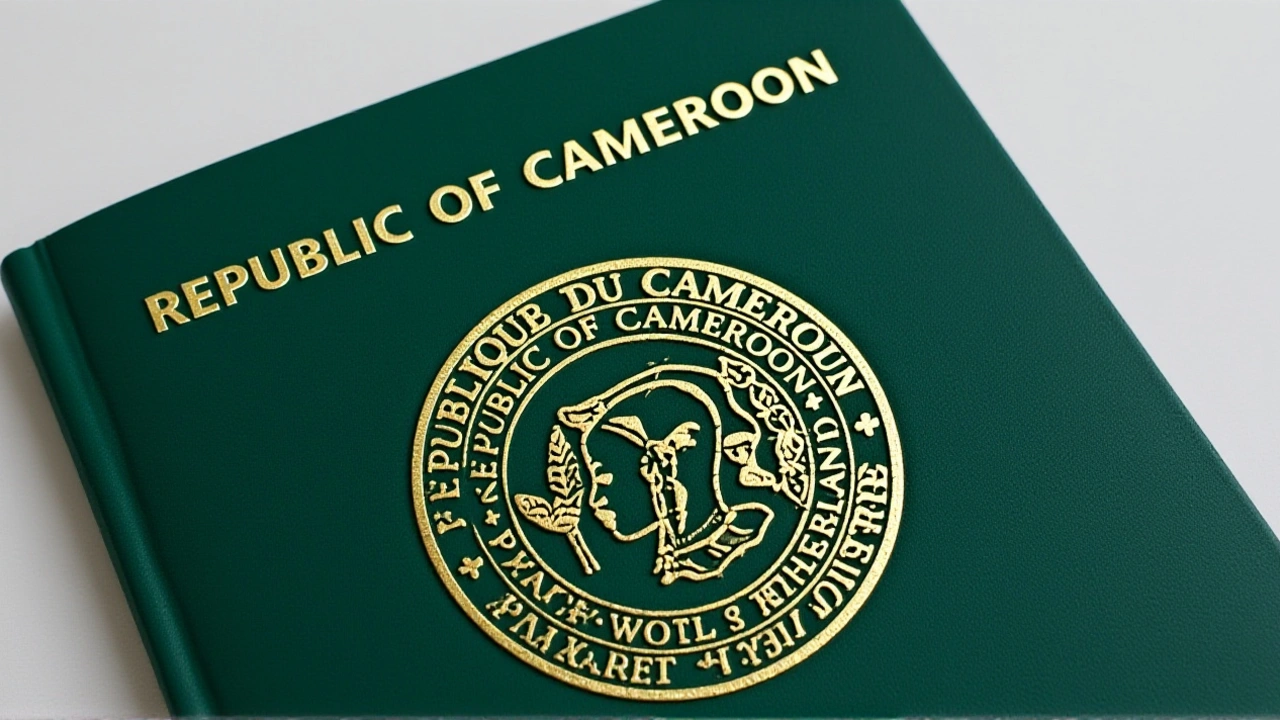
When Cameroon citizens try to book a spontaneous trip, they often hit a wall: the Cameroonian passport opens doors to just 49 destinations, a fraction of the freedom enjoyed by neighbours on the Indian Ocean. The disparity became crystal‑clear in a comparative report released in April 2025, which showed Seychelles passport holders strolling into roughly 150 countries visa‑free, and Mauritians enjoying access to about 146. Dr. Amina Ngako, a senior fellow at the Centre for African Policy, warned that such a gap “limits business, education and cultural exchange for millions of Cameroonians.” The same data set also cited Global Connect and Get Golden Visa as the two most cited sources for passport rankings, each arriving at slightly different numbers because of how they treat e‑visas and visa‑on‑arrival rules.
Why the numbers don’t line up
Different organisations count "visa‑free" in their own way. Global Connect tallied 53 visa‑free or visa‑on‑arrival destinations for Cameroonians, including Bangladesh (visa on arrival) and the United Kingdom (electronic travel authorisation). Meanwhile, Get Golden Visa reported 50 such entries and placed the passport at 92nd in the world. Cameroon‑eVisa.org painted a bleaker picture, ranking the document 173rd and saying it only clears more than 20 nations. The last major player, VisaGuide.World, listed a meagre 25 visa‑free spots as of September 2025. The root of the confusion? Some indices count eTA‑eligible trips as visa‑free, others don’t; some add short‑term tourist permits, while a few exclude territories like the US Virgin Islands.
What the Cameroonian passport actually opens
Here’s a quick snapshot of the places where a Cameroonian can simply walk through the gate:
- Barbados – 90‑day stay
- Benin – 90‑day stay
- Gabon – visa on arrival
- Senegal – visa on arrival for 90 days
- Seychelles – free visitor’s permit for up to 3 months
- Mauritius – visa on arrival
- Kenya – electronic travel authorisation (eTA)
- United Arab Emirates – visa on arrival
Notice the heavy African focus and a sprinkle of Caribbean islands. The list also includes a handful of Asian destinations such as Cambodia and Timor‑Leste, but the United States, Canada, most of Europe and Australia remain firmly locked behind a traditional visa process.
How Seychelles and Mauritius built travel muscle
The two island nations have pursued a very different diplomatic playbook. Both have signed upwards of 30 bilateral visa‑waiver agreements in the past decade, often leveraging their tourism‑driven economies to negotiate reciprocal entry. Seychelles capitalised on its reputation as a luxury destination, while Mauritius positioned itself as a regional financial hub. Their passports now grant visa‑free or visa‑on‑arrival access to roughly 150 and 146 countries respectively – more than three times what Cameroonians enjoy.
Implications for ordinary Cameroonians
Travel isn’t just about sightseeing. For entrepreneurs, a limited passport translates into higher transaction costs when chasing investors abroad. Students face longer processing times for study visas, which can deter enrolment in coveted overseas programs. Even families find it harder to visit relatives living in Europe or North America. As Get Golden Visa noted, “passport strength is a proxy for diplomatic reach,” and the current ranking suggests Cameroon’s foreign policy hasn’t kept pace with its regional peers.

What could change the odds?
Experts point to three pathways. First, expanding bilateral agreements with emerging markets in Asia and Latin America could add quick wins. Second, joining regional mobility initiatives like the African Continental Free Trade Area’s (AfCFTA) visa‑free travel protocol would lift the ceiling for intra‑African movement. Finally, a concerted push to improve domestic governance and security perception might persuade more Western nations to relax entry requirements.
Looking ahead
The next passport index update is slated for early 2026. If Cameroon can seal ten new visa‑waiver deals before then, its ranking could climb a few spots, but closing the gap with Seychelles and Mauritius will likely require a longer‑term strategy. In the meantime, many Cameroonians continue to rely on costly e‑visas for destinations like India, Kazakhstan and the United Arab Emirates – a reminder that a passport is both a document and a reflection of a country’s place on the world stage.
Frequently Asked Questions
How many countries can Cameroonian passport holders visit without a visa?
The number varies by source, but the most widely‑cited figure for April 2025 is 49 visa‑free or visa‑on‑arrival destinations. Some indices count up to 53, while others list as few as 25, depending on how they treat electronic travel authorisations and short‑term permits.
Why does the Cameroonian passport rank lower than Seychelles or Mauritius?
Seychelles and Mauritius have built extensive bilateral visa‑waiver networks through tourism‑focused diplomacy and regional trade agreements. Cameroon, by contrast, has fewer reciprocal arrangements and a weaker negotiating position, which limits its ability to secure visa‑free access.
Which major economies are still off‑limits for Cameroonian travelers?
The United States, Canada, most European Union members, Australia, New Zealand and many South American nations still require a full visa. Even some Caribbean islands, like Saint Vincent and the Grenadines, need a visa despite their proximity.
What steps is the Cameroonian government taking to improve passport strength?
Officials have announced plans to negotiate additional visa‑waiver agreements with Asian and Latin American partners, and to actively participate in AfCFTA’s travel facilitation program. However, concrete deals are still in early talks and may not materialise before the 2026 index release.
How does the passport ranking affect Cameroonian businesses?
A lower ranking means higher travel costs and longer processing times for business visas, which can deter entrepreneurs from seeking overseas partnerships or attending trade fairs. Improving mobility is seen as a way to boost foreign investment and market access.
14 Comments
Sara Lohmaier October 9, 2025 AT 01:04
It is evident from the recent indices that the Cameroonian passport currently grants visa‑free access to a relatively limited number of destinations, especially when contrasted with the extensive travel privileges enjoyed by Seychelles and Mauritius. The disparity underscores the importance of bilateral negotiations and strategic diplomatic outreach. While the data presented is comprehensive, it is essential to consider the methodological differences among the ranking organizations. A concerted effort by the Cameroonian government to engage in multilateral agreements could gradually improve the passport’s standing. Ultimately, enhancing mobility will contribute positively to economic and cultural exchanges.
Sara Lohmaier October 10, 2025 AT 03:27
Life feels unfair when a passport decides where you can go, and this article shows that clearly.
Sara Lohmaier October 11, 2025 AT 03:04
Indeed, the numbers presented, while stark, invite a broader conversation about regional cooperation, capacity building, and the shared aspirations of African nations, and it is crucial that we, as citizens, advocate for policies that prioritize mobility, because freedom of movement is not merely a statistic, it is a lived experience, and collaborative diplomatic efforts could bridge the current gap.
Sara Lohmaier October 12, 2025 AT 01:17
Great breakdown! 😊 It really helps to see the specific countries where Cameroonians can travel without a visa, and it also highlights where advocacy is needed. If you’re looking to expand your network, consider reaching out to local chambers of commerce that have ties with the Seychelles and Mauritius embassies; they often host events that can provide valuable insights.
Sara Lohmaier October 13, 2025 AT 02:17
One cannot afford to read such a superficial overview without first interrogating the epistemological premises that undergird the very notion of a 'passport ranking'. The authors of the piece, while earnest, appear to conflate raw quantitative metrics with the qualitatively richer tapestry of diplomatic capital. Indeed, the stark numerical disparity between Cameroon and its island neighbours merely reflects a historic neglect of proactive consular negotiations. To suggest that Cameroon is merely lagging behind ignores the geopolitical realities that have long constrained its foreign policy agency. Moreover, the footnotes referencing Global Connect and Get Golden Visa are presented without sufficient methodological critique, leaving readers to assume a false equivalence among the indices. A more rigorous analysis would dissect the weighting schemes, the temporal stability of e‑visa agreements, and the macro‑economic incentives that drive bilateral visa waivers. It is also noteworthy that the article glosses over the role of regional blocs such as the African Continental Free Trade Area, whose mobility protocols could, in theory, ameliorate the current impasse. Yet, the political will to fully integrate such mechanisms remains elusive, and that is where the real challenge lies. From a policy perspective, the Cameroonian administration could emulate the strategic tourism diplomacy employed by Seychelles, leveraging its natural assets to negotiate reciprocal entry. Alternatively, the burgeoning fintech sector in Mauritius offers a template for leveraging economic complementarities to secure visa‑free arrangements. Nevertheless, any ambition to close the gap must grapple with domestic governance issues that tarnish the nation’s security perception abroad. In this context, the brief mention of improving governance is insufficient; a comprehensive reform agenda is indispensable. Furthermore, the article neglects to address the intangible soft power that cultural exchange programs can generate, which often precedes formal diplomatic accords. One must also consider the asymmetry of global migration flows, where demand for skilled labor in the West can be a bargaining chip in visa negotiations. In sum, while the statistics are illuminating, they are but a surface reading of a deep, structural set of challenges that require both visionary leadership and meticulous policy engineering.
Sara Lohmaier October 14, 2025 AT 00:30
The analysis raises valid points and suggests that targeted reforms could indeed shift the rankings.
Sara Lohmaier October 15, 2025 AT 01:30
Yo, Cameroon needs to step up its game already 😂
Sara Lohmaier October 15, 2025 AT 23:44
The systemic inertia you describe is symptomatic of a broader macro‑strategic vacuum, where policy inertia, diplomatic opacity, and risk‑averse governance converge to produce a sub‑optimal visa portfolio; such an outcome is not merely a statistical artifact but a manifestation of structural disequilibrium.
Sara Lohmaier October 17, 2025 AT 00:44
Imagine the doors that could swing open if Cameroon harnessed the same bold spirit that made Seychelles a paradise for travelers; the potential is electrifying, and every citizen deserves to feel the thrill of unrestricted horizons!
Sara Lohmaier October 17, 2025 AT 22:57
It’s helpful to view this issue as an opportunity for dialogue rather than competition, and collaborative steps could gradually improve mobility for all parties involved.
Sara Lohmaier October 18, 2025 AT 23:57
While the current figures may appear daunting, they also present a clear roadmap for strategic engagement, and with concerted effort the Cameroonian passport can achieve a more favorable standing in the near future.
Sara Lohmaier October 19, 2025 AT 22:10
Perhaps we might consider incremental visa‑waiver initiatives as a modest yet constructive path forward.
Sara Lohmaier October 20, 2025 AT 23:10
The data simply highlights a need for diplomatic action.
Sara Lohmaier October 21, 2025 AT 21:24
For anyone looking to navigate the current visa landscape, checking the latest e‑visa portals and joining travel forums can provide up‑to‑date guidance and peer‑tested tips.